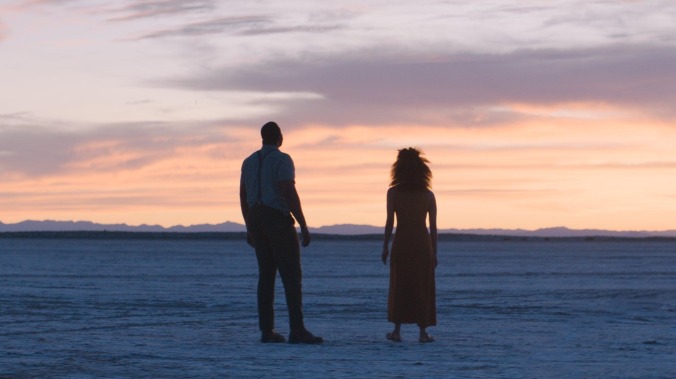The “before life” drama Nine Days is a bold vision of the great beyond
Winston Duke and Zazie Beetz are terrific in a movie that makes strong choices, but often at the expense of subtlety
Film Reviews Nine Days

The thoughtful and ambitious indie drama Nine Days is writer-director Edson Oda’s debut feature, but it has such a distinct look and feel that it comes across like the work of a more seasoned artist. This is both a plus and a minus. More often than not, it’s better when filmmakers have a point-of-view, a sense of style, and something to say—all of which is undeniably true of Oda. But Nine Days resonates at such a distinct frequency that some may find it hauntingly beautiful (and have found it so, ever since the film debuted at Sundance back in 2020) while others may find it much too blaring.
Winston Duke plays Will, an old soul who once spent time in a human body on Earth and has since passed on to serve the universe as a kind of celestial HR director, weighing the applications of new souls for the important job of “being alive.” He works out of a quaint farmhouse on a vacant plain, where he monitors the experiences of the souls he’s chosen on a bank of vintage TV sets, hooked up to VCRs. He takes hand-written notes on the especially stressful or triumphant moments in his people’s lives, storing his observations in a creaky, overstuffed file cabinet.
When his favorite human, Amanda, dies unexpectedly in a car accident while on the brink of success as a classical violinist, Will sinks into a funk, just as he’s in the process of selecting the soul to replace her. He spends his days interviewing the applicants, each with complex and seemingly fully formed personalities, all played by fully grown adult actors like Zazie Beetz, Bill Skarsgård, and Tony Hale. Only one candidate will advance. The rest—no matter how much of an impression they make—will disappear completely. Will spends his nights reviewing footage of Amanda and looking over his notes, wondering if she might’ve crashed her car on purpose—and if so whether that means he failed when he selected her soul. Meanwhile, the never-born Kyo (Benedict Wong) shadows his friend and colleague, serving as Will’s confidant.
Throughout Nine Days, Oda makes choices that are easy to nitpick. Why is Will’s technology so old-fashioned? Why are the souls sometimes completely ignorant of what life is like on Earth while at other times they speak and behave as though they’ve been alive for decades? How does this cosmic bureaucracy actually work? But these aren’t crucial questions, ultimately. Nine Days’ ante-life looks the way it looks and features the metaphysical mechanisms it does because that’s how Oda conceived it. No further explanation is needed.
That said, it’s hard not to compare Nine Days to some of the other movies that have speculated on how the world beyond ours actually functions: films like Pixar’s Soul or Albert Brooks’ Defending Your Life, which have fleshed out how their creators think the universe works in ways that are strikingly imaginative and clever, and more detailed than Nine Days. It’s also hard not to think of Hirokazu Kore-eda’s 1998 masterpiece After Life, which has a similar low-fi setting but considers life from its other end, at an office where souls that have just died have to select one memory to live inside for eternity. (In what may be a nod to After Life, Oda has Will and Kyo give their rejected applicants a chance to experience one perfect moment before they return to the void.)
What sets those other movies apart from Nine Days is a sense of whimsy largely absent from Oda’s film, which is suffused with a sorrowful ache. Nine Days is also more inclined to lean on generalities about what “living” actually means. Much of the plot involves Will testing his applicants by showing them scenes of real-life crises and asking them what they would do. The emphasis throughout is on big emotions and instincts: fear, courage, disgust, exultation, etc. The process is an exhausting grind for the characters, and over the course of the two-hour running time, it can become one for the audience as well.
Where Nine Days excels is as a showcase for its cast, who under Oda’s direction give their roughly sketched-out characters enough dimension to make the whole oddball job interview genuinely affecting. Duke is outstanding as an officious employee who tries—and largely fails—to keep his feelings from bubbling to the surface. Beetz is terrific too as an applicant who mostly chooses not to engage with the process, preferring instead to make the most of whatever time she has. And Hale is disturbingly good as someone whose ingratiating demeanor and glib responses to Will’s questions mask a deeper insecurity.
These performances work so well because they’re grounded in specific reactions to the immediate circumstances. It’s admirable that Oda so often goes broad and grand with his depiction of the human experience, focusing more often than not on the extremes of depression and ecstasy. And again, many viewers are bound to be moved by the choices he makes, which are clear and confident. And yet it’s oddly more touching when Hale’s person-in-training asks if he can ditch the tests for an afternoon and just have a beer with Will. This too is part of life: to want to chill for a bit, rather than facing the big questions every waking second. A Nine Days that played more of the soft notes alongside the bold ones might’ve resonated more clearly.
9 Comments
So you’re telling me this is not the story of a girl who cried a river and drowned the whole world?
select one memory to live inside for eternity…give their rejected applicants a chance to experience one perfect moment before they return to the voidI had a moment, one of the last before my daughter stopped bottle feeding, where I was holding her and singing to her and thought to myself “When I’m on my death bed, hopefully many years from now, please let this be the moment I revisit as I drift off into oblivion.”
It should be in there, right? Personally, I’ve been preparing for my life flashing before my eyes for a long, long time. For many many years now, whenever I’m having a really bad day, like say during a breakup or after having messed up something really important, I’ll look up from my sobbing wretchedness and wave to myself at the moment of my death. I’m hoping that it’ll provide a nice mid-death pick-me-up.
I’ve been preparing by not having any unpleasant memories in case it gets randomly selected.
I feel like this discussion could very easily transform into a commercial for Xanax.
I’m both a sucker for a big conceit like this and sometimes intently skeptical. There was a point in the 2000s/2010s when this kind of metaphysical thing ws very in, but when it doesn’t work you end up with Cold Souls and The Last Word and such. They’re not highly objectionable. Just sort of soggy projects that came from people who idolize Charlie Kaufman (as I did – no shade!) and the more successful mild-mannered branch-offs like Lars and the Real Girl and Stranger Than Fiction. I haven’t seen this film, I’m purely speculating, and it looks sweet-minded, but that’s what crossed my mind. Oh, and let’s all talk about the saga of Another Earth to I, Origins to The Sound of My Voice. Not to mention the “yes!” of The One I Love followed by the “oh dear…” of The Discovery. Again, just my opinions. I love movies.
“the world beyond ours” is cold, infinite and entirely uninterested in you.
There.
‘After Life’ by Hirokazu Kore-Eda is one of my favorite movies of all time, so this definitely peaks my interest. I loved Soul too but wish they could’ve pushed the concept farther than Disney would probably allow. I’m hoping to watch this one day soon if I can.
I think the big difference between this and films like “Soul” and “After Life” (one of my all-time favorites) is that this movie has a distinctive – and for me quite unnecessary – level of cruelty to it. In those other films, as you mentioned, there’s a much larger level of whimsy, but there’s also a much larger sense of empathy for the characters. For example, in “Soul,” whenever a soul finds its “spark,” it gets an Earth Pass, jumps through the portal, and is born. Here, one person of undetermined qualification decides that one soul out of a dozen or so gets to live, while the rest are simply wiped from existence? What kind of cold creator (not to mention inefficient) makes these people and sends them to Will, knowing that most are doomed, some of them automatically given what we eventually learn about Will’s preferences and personal biases? Will tells them all to be honest, then outright punishes them for that very honesty, with no explicit criteria. It seems grossly unfair, and yes, to a degree, so is life itself, but it doesn’t make for satisfying entertainment. Sure, you can brush it off and say that it’s Oda’s creation and he gets to make the rules, but when those rules don’t particularly work, you can’t absolve him of the responsibility he’s created to answer for his own art. There were two very easy ways to improve this concept. 1) Make the interview process for “rebirth” rather than “birth” (which also helps alleviate a somewhat muddied metaphor the film seems to present about sperm fighting to be the one to fertilize an egg), and 2) don’t make the loss permanent. Just treat it like any other job interview and say something like, “We’ll keep you on file” or “There will be other chances.” It doesn’t rob the proceedings of their stakes, and it lends the film that hopeful edge that others of its ilk possess.On the other side of things, I hated how blatantly one of the candidates is set up as a favorite (won’t say who for spoiler purposes). I loved the idea of everyone having a quasi-equal chance once the first wave of applicants was dismissed, but the introduction of the final candidate sees Oda force-feeding them as the one we’re supposed to root for, severely limiting the possible outcomes. Either they win and we’re supposed to be happy, or they lose and we’re supposed to be sad, but whichever way it goes, we’re robbed of any suspense and intrigue, as all but one other character is reduced to fodder. With the highest possible stakes on the line, it’s a cheap bit of story manipulation.I still liked the film, mostly for the camera work, editing, and the spectacular performances across the board (Benedict Wong got an Independent Spirit nomination for Supporting Actor), but those two elements really dragged it down for me.